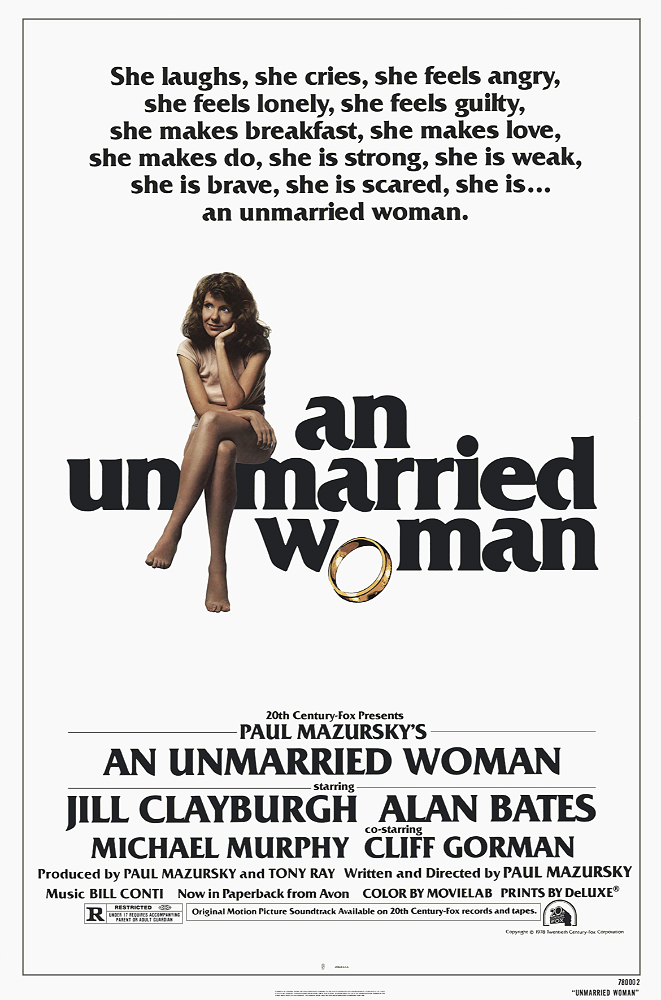
AN UNMARRIED WOMAN
(director/writer: Paul Mazursky; cinematographer: Arthur Ornitz; editor: Stuart H. Pappe; music: Bill Conti; cast: Jill Clayburgh (Erica Benton), Alan Bates (Saul Kaplan), Michael Murphy (Martin Benton), Cliff Gorman (Charlie), Patricia Quinn (Sue), Kelly Bishop (Elaine), Linda Miller (Jeanette), Penelope Russianoff (Tanya, therapist), Lisa Lucas (Patti), Daniel Seltzer (Dr. Jacobs), Paul Mazursky (Hal), Andrew Duncan (Bob), Matthew Arkin (Phil), Ultra Violet (Lady Macbeth); Runtime: 124; MPAA Rating: R; producers: Tony Ray/Paul Mazursky; 20th Century Fox Home Entertainment; 1978)
“Presents a credible single scene.”
Reviewed by Dennis Schwartz
Paul Mazursky (“Blume in Love”/”Moscow on the Hudson”/”Scenes from a Mall”) is the writer and director of this outdated romantic comedy that caught the feminist movement of the 1970s taking hold in the urban areas. But looking at it today, it only has superficial insights into the new women’s movement but nevertheless still presents a credible single scene.
Happily married part-time SoHo art gallery worker Erica Benton (Jill Clayburgh) while walking after lunch in the street with her stockbroker husband, Marty (Michael Murphy), finds that he suddenly stops to bawl and then tells her that he met a younger school teacher in Bloomingdale’s and is going to live with her. Erica bounces off a sharp retort: “Is she a good lay?” and then throws up in the garbage can when alone. She’s now an unmarried woman, and has a hostility for all men. This breakup stuns her group of gossipy loyal girlfriendsElaine (Kelly Bishop), an embittered divorcée who distrusts all men; Jeanette (Linda Miller), a middle-aged divorcée who is having an affair with a 19-year-old still living at home; and Sue (Patricia Quinn), who settled for a compromised marriage as better than no marriage. The girls meet regularly over cocktails for frank discussions at an upscale bar. The split also upsets Erica’s testy 15-year-old daughter Patti (Lisa Lucas), who is in a relationship with nice high school boy Phil.
A depressed Erica gets irate over a pass from her family physician (Daniel Seltzer) and a bad experience from a blind luncheon date (Andrew Duncan), and consults analyst Tanya (Penelope Russianoff). The therapist advises she keep herself open to relationships with men. Following that suggestion to the letter and horny for sex, Erica has a one-night stand with smutty artist Charlie (Cliff Gorman), someone from the gallery who has been trying to get her in the sack for a long time. Erica can dig the sex, but finds nothing else to recommend about Charlie. She then begins a romance with the divorced successful English artist Saul Kaplan (Alan Bates), the only guy she’s met who isn’t a jerk. The two get on well but they each have their own agenda for the relationship that leaves things hanging for the two independent souls who separate for the summer, as he treks off alone to Vermont and she takes a new apartment near the gallery.
New York City and its artist loft scene is used very effectively for mood and atmosphere, and the performances by the entire cast are exceptional. It’s difficult to make relationship films that don’t slide into clichéd sitcom material, and to Mazursky’s credit he’s able to keep his characters real and the situation, though banal, also feels real. Even if the Clayburgh character is rich, healthy, attractive, smart, and has supportive friends, when she’s on her own it’s still a tough scene for a single woman to overcome and this film proves that is so despite the new type of feminism in the air giving women more choices and freedom.
REVIEWED ON 2/27/2008 GRADE: B